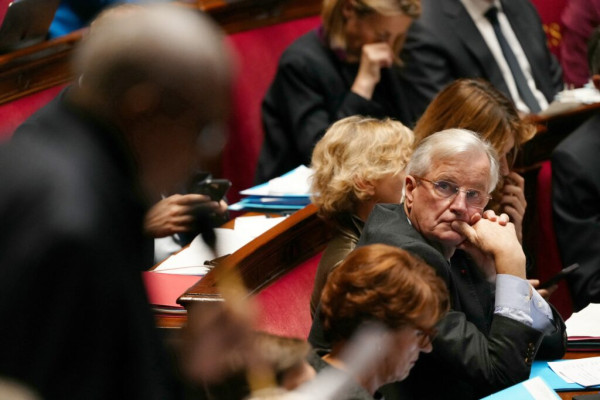Barnier’s first big test: A budget to cut France’s ‘colossal debt’
PARIS — French Prime Minister Michel Barnier is set to unveil his 2025 budget on Thursday in a critical test of both his leadership and whether France’s fractured parliament can function when no party holds a majority.
The National Assembly, the more powerful lower house of the French legislature, is divided into three nearly equal blocs — left, center-right and far-right. After Barnier presents his budget, each group will face a defining choice: Either back the former Brexit negotiator's austere fiscal plan, which includes €40 billion in spending cuts and €20 billion in tax hikes, or risk being seen as perpetuating the political deadlock that has gripped France since this summer's snap elections.
Since his appointment last month, Barnier has prioritized the difficult task of shepherding a slimmed-down budget into law, to cut what he called the country's “colossal debt.” France was placed under the European Union's “excessive deficit procedure” last year for overspending, but its debt has only grown since then.
Barnier is well aware of the stakes, both for France's finances and for his political future.
“I know that I am in the hands of parliament,” he said in an interview with La Tribune Dimanche published Sunday.
Barnier's pronouncements to date, including in his first speech to lawmakers last week, have been short on specifics. The presentation of a detailed budget will now include unpopular taxes and cuts, giving the opposition — and Barnier's erstwhile allies — an excuse to try to bend his government to their will, or even to break it.
Call-your-bluff moment for opposition
In France, how MPs vote on the budget traditionally sends a clear signal as to their political alignment — as either backing the government or against it.
Although the left-wing New Popular Front coalition has welcomed Barnier’s reversal of some Macron-era tax cuts, there is little doubt the left will maintain its firm opposition to the PM.
The left will certainly have concerns about Barnier's likely proposals — Socialist Party leader Olivier Faure, for example, said last week he wants to see authorities do more to tackle tax loopholes and corporate interests. But there's a bigger issue at play behind the sniping: The New Popular Front views Barnier's government as illegitimate.
The coalition claims that because it won the most seats in July's snap election, it should have been given the opportunity to form a government. On Tuesday it tried unsuccessfully to topple Barnier by tabling a motion of no confidence.
That measure failed thanks to Marine Le Pen's far-right National Rally, which declined to support the motion despite being in opposition. In an attempt to appear less extreme to voters, Le Pen’s party is trying to sell itself as a reliable, stabilizing force in French politics — one that is inclined to give Barnier a chance.

“We will judge you on your actions, never, unlike others, on the basis of childish posturing,” Le Pen said after Barnier’s first parliamentary address.
While the far right now holds a sword of Damocles over Barnier's government — an enviable position — it actually faces a tough balancing act. Le Pen and her troops must give the prime minister just enough support to push their agenda and normalize their party's image without being seen as the government's lifeline.
Meanwhile, the PM may find it tougher than expected to corral the support of lawmakers belonging to French President Emmanuel Macron’s centrist coalition. While those MPs nominally back Barnier, they will be pushing him to drop planned tax hikes on France's wealthiest, claiming the policies will kill growth.
Then there's the matter of whether the centrist factions can continue to get along with their ostensible allies in Barnier's conservative party, Les Républicains. The two camps failed to agree on a unified vote for key committee positions in the National Assembly, which in at least one instance resulted in the election of a left-wing opponent. The right's refusal to back a centrist candidate led one frustrated pro-Macron lawmaker to angrily post on X that he would now consider supporting a motion of no confidence against Barnier.
The post was accompanied by a GIF of a shotgun being loaded.
In the hands of parliament
If Macron's troops do decide to betray Barnier, what comes next is unclear.
The French constitution doesn’t define the consequences of a budget rejection in the National Assembly. The last two budgets passed without an absolute majority, through a controversial constitutional mechanism that allows the government to bypass a vote unless a no-confidence motion is passed within 48 hours.
A U.S.-style government shutdown is highly unlikely. Even if the government were to fall due to a dispute over the budget, a new administration could introduce legislation to ensure that taxes continued to be collected based on the previous year's provisions, which lawmakers would have little reason to reject.
“Not doing so would mean that MPs are owning up to the shutdown. It could happen if their goal was for Macron to resign, telling him either you resign now, or the country collapses,” French constitutional expert Benjamin Morel said.
Barnier is acutely aware of the hand he's been dealt, but is pushing back against expectations he will quickly be overpowered by a hostile, divided legislature.
Appearing in parliament last week, Barnier wasn't afraid to take potshots at his rivals and even at his allies. He may have earned their laughter, but he'll need more than pithy one-liners to earn their votes.